DO-IT News May 2017

Volume 25, Issue 3
Below are the articles of the DO-IT News May 2017 newsletter. These articles can also be seen all on one page at the Full Newsletter option.
Meet the 2017 Scholars!
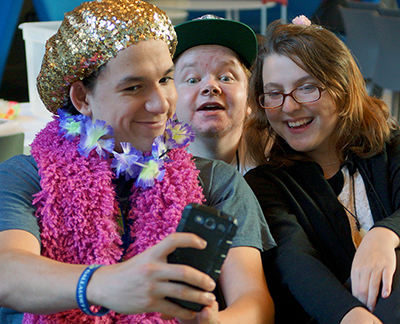
This summer, DO-IT will host its twenty-fifth annual Summer Study program for DO-IT Scholars, providing participants the opportunity to experience life on a college campus and explore challenging academic and career fields such as those in science, engineering, and computing. Primary funding for the Scholars program is provided by Washington State. For more information, visit www.uw.edu/doit/programs/do-it-scholars.
I am pleased to introduce to you the 2017 Scholars:
Alexander attends Capital High School where he has perfect attendance. His favorite classes are math and technology. He is in Future Business Leaders of America (FBLA) and has attended NIKE’s “Believe to Achieve” Leadership Conference, Capital Region Fall Leadership Conference and the Washington State Certified Public Accountant’s Financial Literacy Symposium. He has Duchenne’s muscular dystrophy.
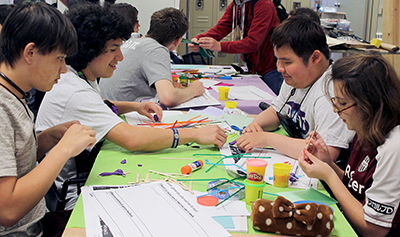
Anna plans to get her degree in education to be a teacher so she can help others achieve their goals and create individualized learning techniques. She is in the National Junior Honor Society. She was recognized in science, work ethic and physical education at Issaquah High School. She has a vision impairment.
Camilo enjoys studying history and science at Spanaway Lake High School. He hopes to pursue a career in computer technology.
Desmond enjoys volunteering and is an aspiring filmmaker. At The Center School, he enjoys his classes in science and world history.
Emma attends Ballard High School. She enjoys her engineering and math classes which drives her interest in a career in either field. She has dyslexia.
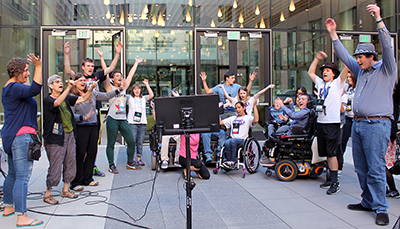
Hayley plays violin with her high school orchestra and symphony. She was also in a musical this year. Even though she enjoys the arts, science and English are her favorite classes. She is in the top 25% of her class.
Jane attends The Center School. She enjoys acting, singing, and dancing in her drama class and drawing in her geometry class. She hopes to go into the arts some day or work with children either in the classroom or by teaching horseback riding.
Jono attends the Northwest School where he enjoys studying history and Spanish. He has cerebral palsy. He hopes to go into the field of sports broadcasting or sports journalism.
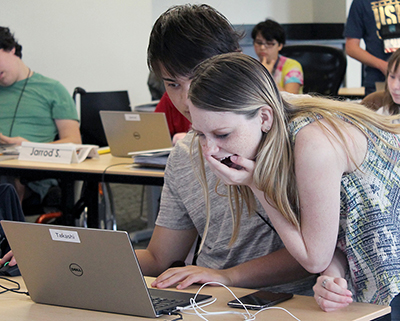
Jordan enjoys playing video games with his friends, reading, and telling stories from his vivid imagination. His favorite classes at Mount Si High School are science and history. He is interested in possible careers in game programming or history. His disability is profound deafness.
Kobey enjoys his advanced placement world history and digital design classes at his high school. He is interested in political science, business administration and marketing. He hopes to own his own business some day. He works with a Seattle-based non-profit.
Miles attends Bellevue High School. He hopes to continue his studies in math and science in college and go on to work in one of those fields. He has obsessive-compulsive disorder (OCD).
Myles is on the golf team at Auburn Riverside High School and volunteers with a non-profit golf organization. He has Asperger’s syndrome. His favorite classes are social studies and science. Since he loves sports, he thinks he might be interested in a related field after college.
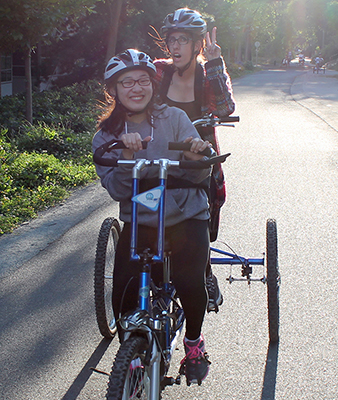
Nathan enjoys participating in drama at Kamiak High School. His favorite classes are math and history. He would like to work in coding or game design after college. He has quadriplegia.
PJ enjoys science and history at CHOICE Academy. He hopes to study law, history or engineering. He will start Running Start in the fall. He has limb-girdle muscular dystrophy, ADHD and dyslexia.
Ryan has a visual disability called Stargardt. He attends Yellow Wood Academy. He hopes to pursue a career in computer science. His favorite classes now are science and history. He is a certified scuba diver and enjoys listening to audiobooks.
Tycho attends Chief Sealth International High School where he is often on the honor roll. He enjoys math and science. He is not sure what he wants to study yet, but has a talent for web design and computer science/programming. He is profoundly deaf.
Ambassador Profile: Anna
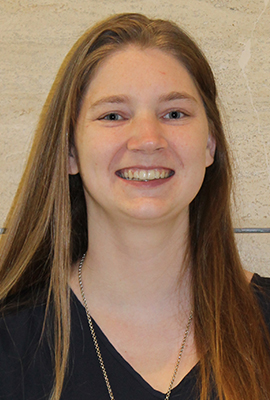
Hello, my name is Anna. I hold degrees in early childhood education, special education, and applied behavioral science. I am currently pursuing a master’s degree in special education with certification in applied behavior analysis. While earning my bachelor’s, I was given the opportunity to co‑develop and teach the first disabilities studies course offered in the Seattle Colleges District. Since getting my foot in the door of teaching, I have guest lectured on many college campuses and organizations throughout King County on various subjects such as disability rights, able-bodied privilege, media representation of disabilities, ableism, and many others.
I jump at any opportunity to educate about disabilities, as oppression and ableism are learned aspects of behavior. Last year, my research on sibling relationships between typically developing children and their autistic sibling was showcased at the Disability Studies Symposium at the University of Washington, noting the importance of acknowledging nuerodivergence and that everyone socializes in different ways. This year, my research on the importance of universal design of learning will be showcased at the Teaching and Learning Symposium, also at the University of Washington.
Following graduate school, I plan to pursue a doctoral degree in disability studies and teach on the subject. My research and dissertation will focus on determining the most effective intervention strategies to eradicate oppression and implicit bias towards individuals with disabilities, while furthering the disability movement.
Ambassador Named University of Washington President's Medalist
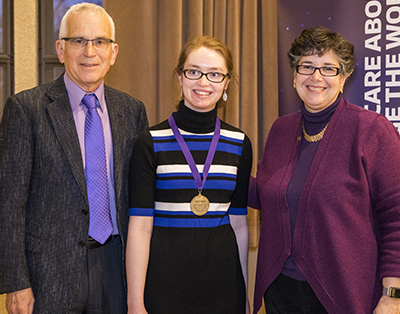
Hannah Werbel, a 2013 Scholar, was awarded the University of Washington (UW) President’s Medalist award for the 2015-2016 academic year. There were three medalists in all; Hannah was the freshman recipient. Winners were selected based on “academic performance as well as their co- and extra-curricular involvement.”
UW President Ana Mari Cauce presented the award.
Hannah is a computer science major and in the interdisciplinary honors program. During high school, she interned with UW’s Center for Neurotechnology (CNT). At the CNT she analyzed data from computer interface experiments via computer scripts she had written. Hannah worked as a teaching assistant (TA) last quarter to teach a programming class. When not in class or researching, Hannah is an active member of both the Husky Marching Band and the basketball pep band, where she plays piccolo.
Hannah also has a passion for accessibility and is the president of the Washington Association of Blind Students. She also works for DO-IT as a member of the ATeam, a group of student leaders who share their experiences on panels, give their input, and help plan events.
Congratulations on this great honor, Hannah!
Read about the other medalists here.
Accommodations and Disability
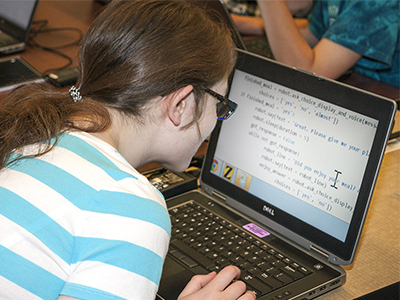
When somebody uses accommodations, people often perceive that use negatively. It is often assumed that the individual using the accommodations isn’t smart enough to succeed on their own. In reality, though, whether or not someone uses accommodations is not related to their intelligence.
I’m a legally blind (low vision) second-year student at the University of Washington majoring in computer science and minoring in physics and math. I am only able to access the same course materials as my peers due to several classroom accommodations.
I use a smartpen, which allows me to audio record my professors’ voices as I take notes. I write in a special notebook that syncs to the audio recording when I write. This way, if I have any questions about the material, I can go back and tap on sections of my notes and hear the lecture again. I use this in conjunction with a note-taker, who can write what the professor writes on the board, including graphs, charts, and diagrams. I can then relisten to my smartpen notes while viewing those visuals up close.
I also use large print and electronic copies of handouts and worksheets. I carry hand-held magnifying glasses with me in case a professor forgets to enlarge something, and I always sit near the front of the room so I can try to make out as much as possible on the board. I also often use low-tech options like using raised stickers to tell different buttons apart in labs or at home.
For assistive technology, I use a screen magnification software called ZoomText to magnify everything on my laptop, which is hooked up to a larger monitor. I also use a screen reader to read longer documents to me, since my eyes can get tired. I sometimes have to use ABBY FineReader, which converts image text into Word documents for me, so the screen reader can work properly. If I have physical copies of textbooks, I use a Pear Camera, which takes photos of pages in a book to digitize them. OpenBook then converts them into accessible text. If I’m taking a test, I use a cool piece of technology called a CCTV, which is a high-powered electronic magnifier that enlarges my test, and I can still write on it.
One of my biggest innovations has been my iPad, where I can carry around thousands of accessible textbooks, as well as my talking calculator app and a variety of other tools. If I’m out at a restaurant and can’t read the menu (or a variety of other scenarios), I often take a photo of it and enlarge it.
I was recently named Freshman Medalist of the University of Washington, meaning I had the highest GPA considering my tough course load and numerous extracurricular activities. I am also in the Husky Marching Band, and am an undergraduate teaching assistant. Many people resent the term “disability” because it implies that some people are less able than others. I personally do not feel that I am “disabled” from doing anything, despite my vision. With innovation and certain accommodations, I have the potential to do anything I set my mind to. Whether someone takes the ramp or the stairs, they are still able to get through the door. Even though some people use different tools, it does not mean that the outcome of their work or their project will be lesser than that of others.
Washington State University and Policy #188
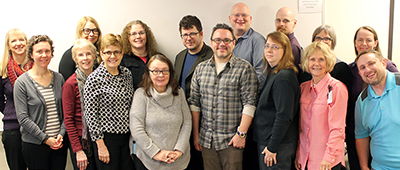
On February 21-22, Accessible Technology Services at the University of Washington (UW) hosted a contingent of visitors from various Washington State University (WSU) campuses to share knowledge about accessible IT and how it relates to the new State of Washington Policy #188, which states that state agencies must procure and deploy accessible information technology products.
Sixteen individuals from different WSU campuses attended (Pullman, Tri-Cities, Spokane, Everett, and Vancouver), including members of the WSU Vancouver Accessibility Council. Presentations included the priorities and interest of the WSU Vancouver Accessibility Council, an overview of Policy #188, information about DO-IT’s mission and resources, and WSU’s efforts in the area of accessibility. Accessible Technology Services also provided a tour of UW’s Access Technology Center and Disability Resources for Students, followed by a discussion of accessible technology.
The feedback from WSU about there experience was “This was truly a valuable experience and we learned many important lessons from your group.”
Preparing Your Child for College
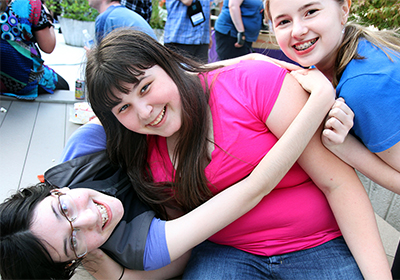
Parenting is a job that is constantly changing, and it comes with many fears and emotions as your child gets older and becomes more independent. This can be a difficult process for any parent, including those with a child with a disability.
My daughter Lindsay is neurodivergent with autism spectrum disorder and attention deficit disorder. Lindsay has always had a strong sense of self. She is rigid in some of her beliefs, and has always been a late bloomer. It has been difficult for me to realize that she does not operate with my same sense of urgency and on my time schedule.
We began talking with Lindsay about college at an early age. While academically bright and a voracious reader, she was not the best scholar in high school, preferring to pursue only what interested her. She and her teachers were often frustrated with her lack of motivation. College intrigued her because she heard that you were able to pursue studies that interested you.
As Lindsay got older, we required her to attend 504 meetings with her teachers, so she could explain how school affected her emotionally and academically, as well as what accommodations she thought would best help her handle the stress of school. Involving her in the conversations with her academic team, on how to approach her teachers, due dates, work habits, and expectations was critical to her success.
We allowed her to fail classes when she did not meet the academic standards. She had to do summer work to catch up, and she quickly decided that she’d rather do her work during the quarter than during the summer. Experiencing failure provides young people, including those with disabilities, the opportunity to make a new plan to regroup and recover. Too often, parents try to protect our children from failing, hampering their opportunity to handle difficult situations.
As parents, we felt that it was important to teach Lindsay about her disability, both through books and by meeting others who were neurodivergent. Sometimes we’d try to push her into activities that were uncomfortable for her, which she often resisted. The DO‑IT Program was a major turning point for her, for it was when she came to realize how she would be able to learn, socialize, and advocate for herself at college. When she returned to high school after Phase I of Summer Study, her mentor suggested they promote a stronger college experience, where Lindsey would have to reach out to get support, and her mentor would no longer check in with me. Lindsay had to learn how to ask for help, make decisions, and follow through on her own—all important skills for a successful college student to have.
Lindsay was very excited the first time we visited Pacific University—right away, we knew the hard work we had invested was time well spent. I had her sign up with Learning Support Services early, so she could get her documentation submitted and her needed accommodations set. Orientation was a struggle, but Lindsay quickly learned where to go when she needed guidance and how to get help.
One of the biggest struggles for most students, not just those with disabilities, can be dorm life. Dorms are small, and students don’t usually agree on quiet time, visitors, parties, and more. Lindsay tried her first year, and struggled deeply with the situation. After that, we chose to pay the extra fee to ensure she had a single room so she could have a quiet place she could go to be alone. However, after her study abroad experience her junior year, she felt comfortable enough to move in with roommates again, this time being friends she knew and had chose because they shared common interests and values.
Safety was also a big issue we discussed with Lindsay. While college campuses work hard to ensure safety and prevent bullying, we wanted Lindsay to be able to assess risk herself. We discussed walking alone, drinking and drugs, and dealing with strangers. College is a great time to meet new people and socialize, but it is also a place where students come into many new situations and don’t know how to react—safety is important for all students to learn.
Lindsay is currently a senior at Pacific University, working on her thesis project for her German major and her writing project for her creative writing major. She is both excited and overwhelmed at the idea of graduating. While we are always here to support Lindsay and be coaches, we have also learned to step back, celebrate, and just enjoy her journey.
Preparing Yourself for College
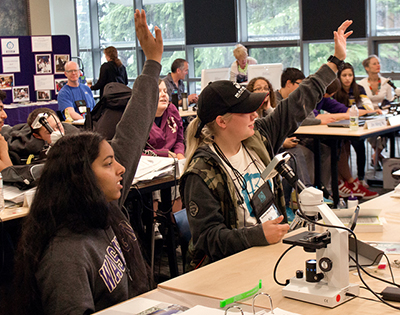
The first thing I’d recommend to anyone going off to college, especially a fellow student with a disability, is to push limits. The concept might be frightening for someone who has never been inclined to push any limits. I was always someone who put in the minimal effort to pass my classes and rarely stretched beyond my comfort zone in high school—this attitude was a poor fit for college and would have led to a dissatisfying experience had I not tried to branch out.
In the college life experience, you are, ultimately, on your own. You can still have the support of parents and/or caretakers, professors, and the disabilities resources that your campus supplies, but in the end both in classes and out of them you have to learn self-sufficiency. This means keeping a healthy balance of diet, exercise, socialization, and sleep, as well as attending classes and completing assignments. These skills were especially hard to learn as a young adult on the autism spectrum who had always had my parents feeding me and sending me off to school.
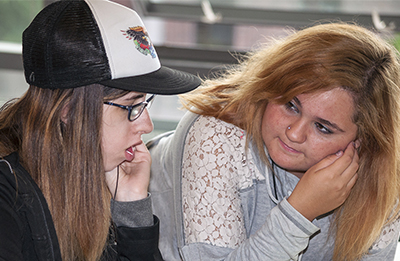
Compromises, both with yourself and the people around you, are crucial. I had to learn how to sit down and just do my homework without prompting, because nobody is going to tell you to do your homework or go to class. Even as a college senior, I’ve been struggling with being self-driven to succeed. You will need to advocate for yourself if you have a need for help, because rarely will anyone approach you and ask what you need.
Beyond just classes, your living situation is a part of life that can become a point of conflict. If you’re a freshman living in the dorms, you’re probably not going to get to have a choice roommate or dorm. Even if you don’t become friends with your roommate, the best thing you can do is live in harmony with them; make sure that boundaries and needs are established from the beginning and that you can openly discuss any problems or changes. After freshman year you’ll probably have more leeway in selecting where you live and with whom, which is why it can be important to make friends in your freshman year.
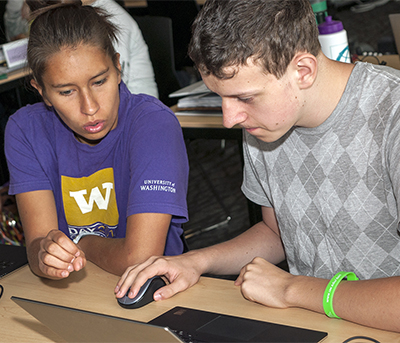
If you are having an issue with your roommate and you can’t easily resolve it, your best bet is to go to your resident advisor (RA), whose job it is to keep the dorms a safe and comfortable place for all residents. Likewise, other issues in your dorms such as noise violations after quiet hours should be reported to the RA—you don’t have to be stressed about getting enough sleep before your early morning test, since you can tell your RA about your neighbor’s loud music. Academics come first and you have as much right as any other student to feel like you’re in an environment conducive to your academic success, mental health, and physical safety.
Making friends can be difficult in college, but having a social group is crucial; my friends are the ones who helped me get through stressful situations, checked up on me if I was struggling, and prompted me to try new things that were fun and engaging even though I was reluctant. However, if you really feel uncomfortable about a situation, don’t let anyone, even a friend, push you into it. Friendship includes boundaries, too. The best way to make friends is to talk to classmates and attend clubs and extracurricular events tied to your interests, and even if those aren’t the friends you keep your entire college career, they can open the way to new possibilities.
The Power of Representation: Autism in the Power Rangers Movie
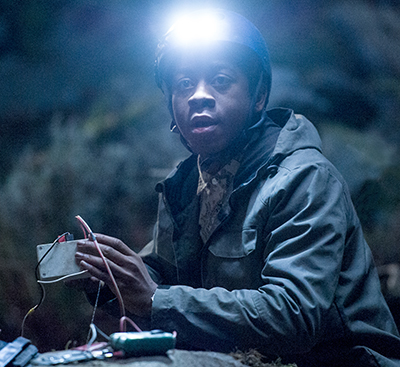
When I went to see the most recent Power Rangers movie, I wasn’t expecting anything more than to watch a fun movie. But then Billy Cranston, one of the main characters, said four words that shook me to the core: “I’m on the spectrum.” I, too, am on the autism spectrum, and I have been perpetually let down by Hollywood’s portrayal of autism. Most of the time, autism is portrayed as a weakness for a character to overcome, or even just to turn the character into a prop. To my amazement, I found that this was not the case with Power Rangers.
Billy’s autism was portrayed as an asset, not a liability. His meticulous attention to detail allowed him to pick up critical information long before anyone else did. His special interest — in this case explosives and other scientific phenomenon — not only proved useful, but actually set the plot in motion. Most critically, Billy proved to be an extremely empathic character. A common misconception about autistic people is that they lack empathy, but in actuality, while autistic people can have difficulty identifying the emotions of others, they tend to respond more empathically than average once they have done so. Billy’s empathy helped the other main characters form emotional bonds with one another, which proved critical in unlocking their abilities and resolving the plot.
I have been let down by Hollywood’s portrayals of autistic people as burdens to the neurotypical or clueless savants over and over again, so to encounter an almost perfect portrayal of autism in a Power Rangers movie of all things was a delightful surprise. The combination of this portrayal, witty dialogue, detailed character arcs, and plentiful action made Power Rangers not just a good movie, but an extraordinary one.
AccessEngineering Hosted Third Annual CBI
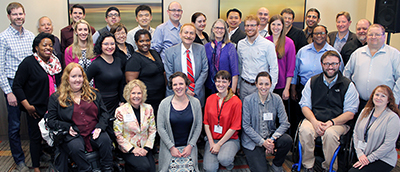
AccessEngineering hosted its third annual capacity building institute (CBI) on April 19-21. The event focused on integrating disability, accessibility, and universal design into engineering course materials, projects, and curriculum.
Special guest Dan Formosa, well known for his design work including the OXO Good Grips kitchen tools—which became a symbol of “design for everyone”—led a workshop on assumptions and designing for all, including people with disabilities. Participants had to rate how difficult it would be for a person with a specific disability to accomplish each task in order to make a large breakfast, and then design tools or an environment that would make those tasks easier. Partway through the workshop, Dan added the extra challenge of designing for multiple disabilities instead of just one.
The event successfully brought together faculty, students, disability resource service providers, and professionals with disabilities to create resources and action plans that could be implemented after the event. Discussions also revolved around what engineers should know about universal design and what would help an engineer integrate universal design into the engineering curriculum.
Resources from the CBI and proceedings will be hosted on the AccessEngineering website.
DO-IT Scholars Share Why College is Important
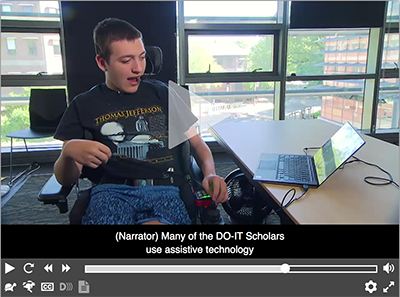
DO-IT Scholars see college as a place to grow and develop skills necessary in today’s workplace. DO-IT Scholars is an innovation transition-to-college program that hosts a summer study on campus each summer. Last summer, Scholars helped DO-IT create a video expressing their reasons why college is important. Watch it online at www.uw.edu/doit/videos/index.php?vid=74.
DO-IT has also added eight additional new videos online! Learn more about accessible programming, college experiences of students with disabilities, broadening participation in engineering, and a variety of topics at www.uw.edu/doit/do-it-videos.
My DO-IT Internship Experience
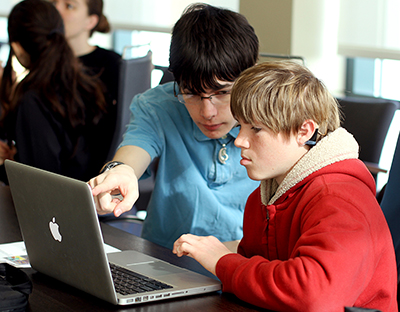
A colleague of mine reached out to me after I told her my red thread for my master’s program: students of color living with disabilities. She mentioned DO-IT and how they have supportive staff and that they are doing meaningful work. Shortly after I reached out to DO-IT, I was given the opportunity to intern at the office. I came into DO-IT with an open mind and an eagerness to bring my perspective to the office. I was fortunate to be able to plan my internship with my supervisor based on my interests and passions. I got to know the staff and was able to learn about their work and find ways to incorporate my interests into current projects.
My main focus for my first project was Native student representation. I was able to use my experience as a Native woman with a disability to find ways to reach out to students with similar demographics in high school. I recruited by reaching out to a family friend of mine who works in Native education. After our collaboration, I successfully recruited a couple Native applicants for DO-IT Scholars. I was absolutely elated when I heard the news. Even though it was a small feat it still made a difference. I will cherish this opportunity and memory after my time at DO-IT.
Another project I was able to work on was recruiting schools with majority students of color into the AccessComputing program. I was able to send recruitment emails to over 200 schools. The first step in getting the word out was a catalyst for future partnerships. I was also able to go to many events and serve on a handful of panels. My voice was valued, and I felt like an integral part of DO-IT. With this experience, I know I have the power to share my voice in other programs and institutions I work with in the future.
After working on these major projects, staying involved with events, and working on other smaller projects, I’m leaving DO-IT with many new skills and experiences. I have built important relationships with DO-IT staff and will continue to collaborate with the office. I also found my voice in a more concrete way while working here. I realize I have so much to offer for future program outreach and research. This internship was an incredible experience, and I will always keep the time I spent at DO-IT with me wherever I go.
Thank you DO-IT for this amazing opportunity. I’m sad to leave but I know I will always stay in touch.
Engineering Discovery Days
After being asked to help staff Engineering Discovery Days, I had no idea the experience I was committing myself to. Since I’ve only been working for DO-IT for a few months, I asked the other student assistants about their experiences – everyone assured me that I would have fun, but that it wasn't going to be a relaxing time. Growing up with a mom who is an elementary school teacher, I felt aptly conditioned for the task at hand, though it had been a while since I was around so many kids.
I spent extra time learning about the accessible science materials we were displaying so I could answer any question thrown at me; I was excited to inspire a few young students to pursue higher education in STEM (science, technology, engineering, and math). Though the morning began rather quiet, within hours, our display turned into a revolving door of children, parents, and teachers. We constantly explained what the specific instruments were and how they enabled people with disabilities to pursue STEM education.
Still, in the chaos of the day, there was one fourth grader who made a deep impact on my experience at Discovery Days. Like most of the kids, he asked me, “What is this?” in reference to the Color Teller. After explaining to him, his face lit up. He was colorblind, and he often struggled in school to distinguish between reds and greens in particular. After he got to try it out, he remained at the table for over 15 minutes, asking about each and every piece of equipment on the table. It was that moment that made me realize the tangibility of accessible technology. And because of him, I’m excited to work Engineering Discovery Days next year!
Brain Awareness Week Open House
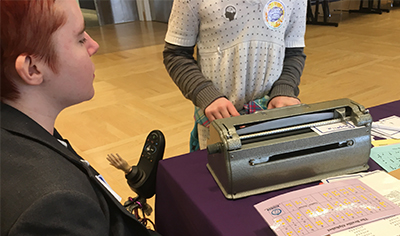
In March, DO-IT participated in Brain Awareness Week at the University of Washington. Brain Awareness Week is a nationwide effort organized by the Dana Alliance for Brain Initiatives and the Society for Neuroscience to promote the benefits of brain research. DO-IT hosts a booth for this event every year because we believe that promoting the inclusion for people with disabilities in STEM is important to talk about at outreach events.
Our interactive booth allowed K-12 students to learn about how students with disabilities engage in science. We showed off a braille type-writer for kids to learn about braille, and other resources for students with disabilities who are interested in STEM. Our main goal is to show them that researchers and scientists can have disabilities; they can DO-IT!
Universal Design in Higher Education: Promising Practices Call For Articles
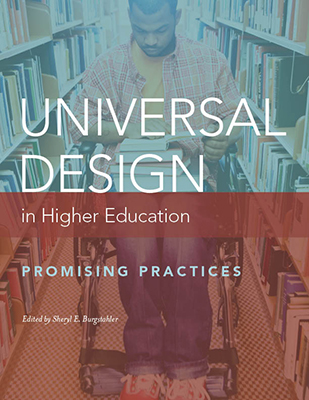
In DO-IT’s online publication, Universal Design in Higher Education: Promising Practices, practitioners share promising practices related to the application of universal design in postsecondary education settings. This collection of promising practices complements the more general content in the printed book, Universal Design in Higher Education: From Principles to Practice, which recently published a second edition under Harvard Education Press.
This complementary publication is available freely online. It can be freely copied and distributed as a book or in part for noncommercial, educational purposes. The collection will continue to grow as more articles are submitted.
Articles may be submitted at any time to udhecop@uw.edu. Submitted articles should include specific ways practitioners and researchers have applied universal design in postsecondary settings along with evidence of success. They are peer-reviewed by members of the Universal Design in Higher Education Community of Practice, and if accepted, edited by DO‑IT. Articles selected for the online resource are freely available on our website. Authors must agree to these conditions while retaining copyrights to their individual contributions. For author guidelines, consult the preface of the book.
About DO-IT
DO-IT (Disabilities, Opportunities, Internetworking, and Technology) serves to increase the successful participation of individuals with disabilities in challenging academic programs and careers, such as those in science, engineering, mathematics, and technology. Primary funding for DO-IT is provided by the National Science Foundation, the State of Washington, and the U.S. Department of Education.
For further information, to be placed on the DO-IT mailing list, request this newsletter or other materials in an alternate format, or make comments or suggestions about DO-IT publications or web pages, contact us at
DO-IT
University of Washington
Box 354842
Seattle, WA 98195-4842
doit@uw.edu
www.uw.edu/doit/
206-685-DOIT (3648) (voice/TTY)
888-972-DOIT (3648) (toll free voice/TTY)
509-328-9331 (voice/TTY) Spokane
206-221-4171 (fax)
Founder and Director: Sheryl Burgstahler, Ph.D.